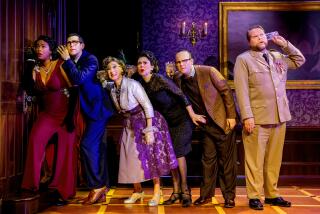Review: ‘Nice Work if You Can Get It’ makes Roaring ‘20s whimper
NEW YORK — Anyone out there heard of George and Ira Gershwin?
Well, apparently, the brothers — long dead, if I’m not mistaken — have a “new” musical comedy, which opened Tuesday at the Imperial Theatre on Broadway. The show, which stars Matthew Broderick and Kelli O’Hara, is called “Nice Work if You Can Get It,” but please don’t get the idea that the songwriting legends have been granted a second coming.
The only miracle going on here is a marketing one. A treasure-trove of tunes by the Gershwin boys has been repurposed into a wobbly jukebox musical, with a hot-off-the-press book by Joe DiPietro (“Memphis”) that’s inspired by material by Guy Bolton and P.G. Wodehouse. That’s the duo who wrote the book for “Oh, Kay!,” the frolicsome 1926 Gershwin relic in which Broderick’s character, the Jazz Age aristocrat Jimmy Winter, finds himself in a vaguely similar romantic jumble with a sexy fugitive bootlegger who’s storing hooch at his Long Island estate.
The story has been heavily revamped, but I’d love to get Bolton and Wodehouse on the Ouija board to see what they’d make of Broderick’s absentee portrayal, a performance so oddly lackluster that it’s as if he isn’t so much playing a role as causally trying one out for future reference.
Although he was part of one of the biggest successes in Broadway history with “The Producers,” Broderick has had difficulty of late finding his stage footing. Age has at last caught up with Ferris Bueller, and the actor’s patented boyish shtick doesn’t seem quite as lovably hapless now that he’s reached the half-century mark.
Playing a man about town who must clean up his act if he is to take over the mysterious family business, Broderick is the dead spot in a production that can’t afford to have one at its center. But it’s doubtful that even a more buoyant lead could make “Nice Work” tantalize like vintage champagne bubbles. The show just can’t seem to work out the pastiche formula that allowed”My One and Only”(1983) and “Crazy for You” (1992) to become hit Broadway “revisals,” to use the term that has been waggishly applied to this category.
Recapturing the stylistic magic of another era is tricky business, even with O’Hara, Broadway’s most luscious soprano, interpreting Gershwin standards as Billie, the bootlegging beauty who sets off romantic sparks with Jimmy just as he’s about to tie the knot with Eileen, an egomaniacal avant-garde dancer and the spoiled brat daughter of a senator (Terry Beaver). And though Kathleen Marshall would seem to be the ideal director-choreographer for the job (her Tony-winning revival of “Anything Goes” is still tap-dancing Broadway audiences into euphoria), the production’s rhythm is more tentative than fascinating.
Not that there aren’t plenty of inventive moments. The brush-stroke of Marshall’s impressionistic choreography — yes, she paints with dance — is confidently brisk, especially when the chorus girls, those long-legged beauties from Jimmy’s past, pop up on Derek McLane’s efficient sets in search of a good time. It’s a delight the way even solo turns giddily transform into ensemble numbers. As Eileen (a game Jennifer Laura Thompson) serenades herself in the bath after thinking she has been legally wed to Jimmy, dancers rise up like soap bubbles to provide whimsical choreographic enhancement.
If only the book were as assured as the marvelous Judy Kaye, who as Eileen’s rabid prohibitionist aunt literally starts swinging from the chandelier after Cookie (Michael McGrath), a tough-talking bootlegger posing as a butler, spikes her lemonade. But the farce, which often has the feel of a copy of a copy, doesn’t build enough zany momentum. And how can it with DiPietro tossing together more plots than can be summarized in a review, never mind effectively sorted out onstage?
Timeless Gershwin songs are shoehorned into the story with little concern for narrative relevance. Why the first act concludes with “Fascinating Rhythm” is a mystery, though my suspicion is that the creative team was trying to supply in name what was conspicuously missing in reality.
The book musical came into its own after George Gershwin’s heyday, but could shows pre-”Oklahoma!” really have been this much of a chore when characters weren’t belting or hoofing? The only thing holding my interest was the question of when Estelle Parsons, who plays Jimmy’s mother, would finally appear. The suspense over whether this Oscar-winning veteran had been cut from the production (but not yet the playbill) surpassed even the excitement of how Jimmy and Billie’s romantic fate would unfold. (Parsons does eventually come on the scene, deus ex machina style, to help resolve the impossible plot.)
O’Hara looks fetching in both the male and female costumes Martin Pakledinaz has designed for her. (When we first encounter Billie, she’s disguised as a slim thug, as dangerous as she is alluring.) And, more important, she sounds as sublime as ever — her lilting renditions of “Someone to Watch Over Me” and “But Not For Me” lend the show what little authenticity it has.
During Broderick’s first number, “Sweet and Lowdown,” it seemed reasonable that he was underplaying out of respect for realism. The character is not only drunk but is singing and dancing alongside professional chorus girls and an equally adroit group of “society guys.” The trouble is that Broderick never kicks it into high gear. His performance, like the show as a whole, makes the ‘20s seem not so much roaring as murmuring.
ALSO:
‘Ghost: The Musical’ on Broadway: What did critics think?
Review: An extraordinary ‘Cloudlands’ has world premiere
Theater review: ‘The Convert’ at the Kirk Douglas Theatre
¿
More to Read
The biggest entertainment stories
Get our big stories about Hollywood, film, television, music, arts, culture and more right in your inbox as soon as they publish.
You may occasionally receive promotional content from the Los Angeles Times.











